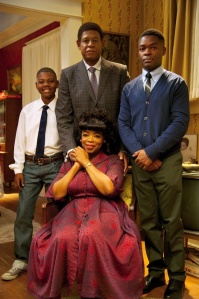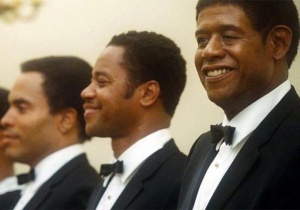Lee Daniel’s latest hit film “The Butler”, tells the story of the Civil Rights movement from a unique perspective. That of a black domestic, seen as an embarrasing relic of slavery by some, and a dignified example of hanging in there by others, in the time of the greatest change regarding race in this country, the Civil Rights movement. It’s a very unique film in that although Cecil Gaines, potrayed by Oscar winner Forrest Whitaker, was working in the midst of some of the most powerful men on earth, U.S Presidents, the movie does not focus on them. The black butler figure, “The Help”, has long been one who stood in the shadows to service the wealthy white people, and as Cecil was advised in the film, one who should be almost “invisible.” This particular movie focuses on the Butler and his home life, his family, his children, how he partied, and what his position was in the larger political scheme of the times. It also deals with the type of Generational conflict and change dealt with in Strauss and Howe’s book “Generations: A History of America’s Future”, and in numerous shows since the ’60s such as “All in the Family” and “Family Ties.” In this instance, it shows how many older blacks were dubious of the Civil Rights movement, not that they disagreed with it’s goals, but incidents within their own life and times that formed their impression of the world told them it was much safer to struggle for racial equality by simply doing their jobs right. However, the film attempts to show how many were brought around by the earnest dedication of their children.
The film pretty much sets the tone for Cecil’s character in the beginning when his father is savagely cut down in front of his face. This happens in the early ’20s. At that point, the lady of the house comes and tell’s Cecil, “I’m going to teach you how to be a house nigger.” It’s probably one of the most jarring lines I’ve ever witnessed in a movie, not because it’s a white person freely using the “n-word” (big deal), but because she is freely acknowledging a system that caused a lot of resentment in the Black community. That word would follow Cecil throughout his life and serve as a term he used to define himself against, and ultimately break free of.
Cecil eventually finds himself a Butler at the White House, his job interview for which a fancy, HNIC type of guy uses that term again, telling him, “you’re gonna make a good house nigger.” Cecil goes on to be successful as a Butler, enjoying his job, mastering the protocol that comes with it, and taking care of a family that includes his wife Gloria, portrayed with finger popping verve by Oprah Winfrey, and his two songs, Louis and Charlie. Seeing Cecil in these phases of his life hold particular relevance for me, because he reminded me of the type of brother about whom black people used to say, “he got a good job.” I’m sure his neighbors don’t look at him as a servant. They saw a man who drove a big American model car, took care of his family, and who’s wife didn’t have to work.
One of my favorite things about the film, is it reanimates the old days of black families and neighborhoods, with functioning, working fathers. There are several scenes that feature everybody getting together and partying at the Gaines’ house. There is one scene that features James Brown’s landmark 1964 single “Out of Sight”, with Cuba Gooding doing a mean James Brown impression with his wife’s wig on. “The Butler”, in its focus on black characters, takes us inside of the lives of it’s Butler characters when they go home. Lenny Kravitz does a fine job as James Holloway, a co worker with Cecil at the White House. Lee Daniels has a penchant as a director for deglamorizing his actors, casting them in roles that play against their public images. Here, Kravitz is cast as the Butler who is a little more aware of public affairs, who is more of an intellectual than his counterparts. But, it is still incredibly fun to see suave, model dating Lenny Kravitz married to a big, heavy set sister. It does much to humanize Kravitz in his potrayal. Cuba Gooding stars as Carter Wilson, a White House butler who also happens to be the horn dog, rude boy of the crew.
It has been said before of the Baby Boom generation that their desire to change the world and their belief that it was possible to bring this change about was based on Post World War II prosperity and the relatively privileged upbringings they had compared to people raised during the depression. Gaines’ son Louis is an example of this archetype, raised in a middle class setting, with the oppurtunity to go to college, Louis chooses to get involved with the Civil Rights movement, and later, Black Power through the Black Panthers. He is ashamed of his dad for many years due to his occupation as a Butler. For many years there is a rift between the two, as dad thinks that things are improving enough on their own, due to the resonableness of the men he works for in the White House, such as President’s Eisenhower, Kennedy and Johnson, who are either pushing Civil Rights legislation, or backing Supreme Court decisions. Louis however, is a part of the new generation, a generation John F Kennedy himself described as impatient, standing on a “New Frontier.”
Tragedies of all sorts befall Gaines, including almost losing his marriage due to his tight focus on his career, until one day, he finally realizes his son was right all those years. It’s as if Archie Bunker decided to join Meathead. Gaines is in no way as obnoxious as Bunker, but the potrayal of the Butler does bring up an interesting aspect of the Civil Rights movement ,one that many modern audiences, in their monochromatic characterizations of black people don’t contemplate, that there were many older black people who were made nervous by the direct action of the Civil Rights movement, let alone the protestations of Black Power.
Oprah Winfrey does a fantastic job as Gloria Gaines. Once again, Lee Daniels strength as a director, much like Quincy Jones as a producer, is his casting, and the way he makes stars play against type. For instance, in this movie, we get to see Oprah Winfrey call a young militant woman dating her son, a “bitch!” Oprah plays a finger popping, boogalooing, heavy make up wearing, ‘lets have a party at my house’ big mama, and she plays her well. Not only does Oprah humanize the role, the role also serves to humanize Oprah, connecting America’s richest black woman to a lot of regular women she most likely grew up watching. There is a scene that is delightful that features Gloria dancing to an outrageous Soul Train line clip, to Philly Iternational artists People’s Choice’s record “Party is a Groovy Thing.” The choice of song seems especially fitting, instead of choosing some of the spacier hits of the early ’70s like Billy Preston’s “Outa Space” or “Higher Ground” by Stevie Wonder, which seems more like music the kids and teenagers of the ’70s were in to, they chose a down home funky record by a bluesy group that was pretty much grown folks business.
All in all “The Butler” is a fun and valuable piece of American history told from a black perspective that is rarely seen on the screen. It will inspire warm feelings for those raised in black neighborhoods who remember the get togethers the old folks used to have, and it actually asks both father and son to thank each other for the same thing, providing freedom for each other, which is a rare thing. It also provides a realistic portrait of a marriage and two people growing older together, going through the ups and downs and loving each other despite aging makeup. Even if you don’t get a chance to catch it in it’s theater run, make sure to have it handy around the house to teach your kids about “back in the day.”



One reply on “Quick Thought’s On Lee Daniel’s “The Butler””
Interesting take on this film and it’s nuances. Though I’ve never seen it there is,as with homosexuality’s portrayal in film,this sense of implicit energy running through the black cultural ethic in Hollywood. Even if generationally the “get real” 1990’s tried to underplay it; its always there somehow. Its always good to evoke ‘Generations’. What William Strauss and Neil Howe put out there in the early 90’s not only has a positive effect on writing. But on cultural tracts such as what ‘The Butler’ is stated here as portraying.